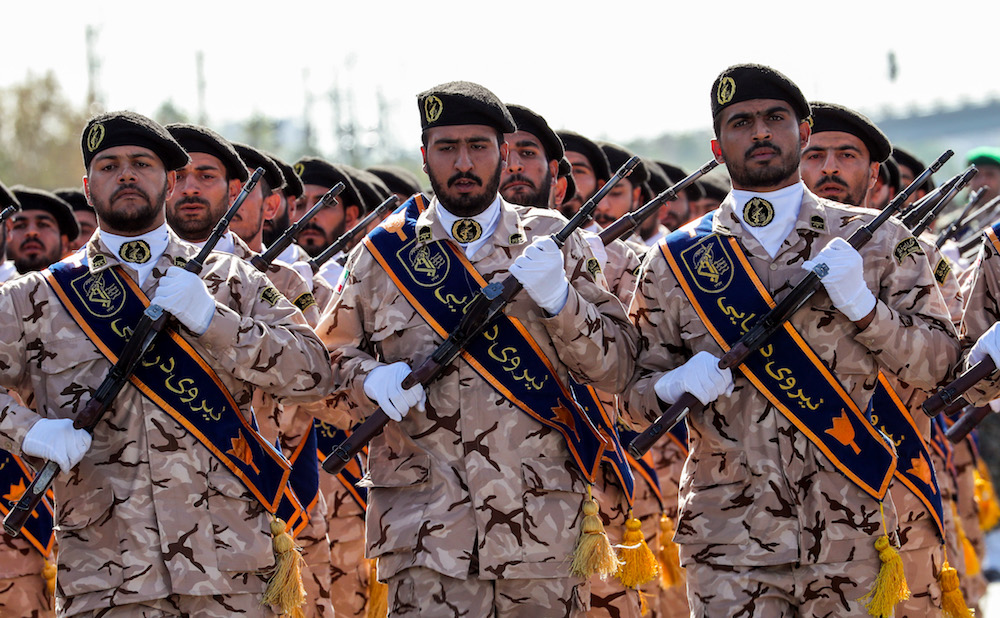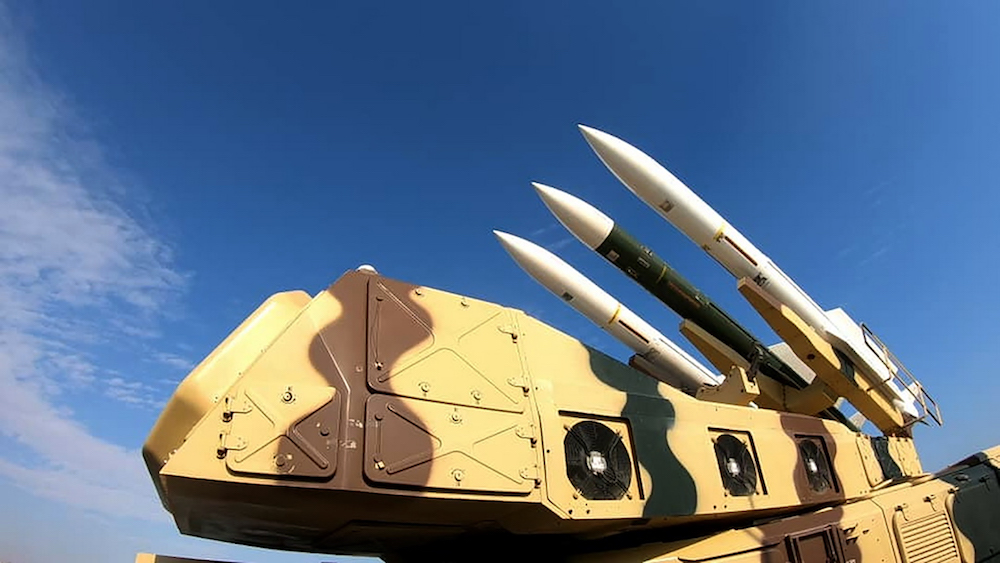WASHINGTON, DC: Mike Pompeo, the outgoing US secretary of state, made a splash last week when he unveiled new intelligence pointing to an enduring operational relationship between the regime in Iran and Al-Qaeda’s international terror network.
Although senior Al-Qaeda operatives are long known for using Iran as a transit point and shelter, what many policymakers and the general public have failed to grasp is just how vital the safe haven offered by the Islamic Republic has become to Al-Qaeda’s survival.
Iran is now officially the last government in the world that knowingly harbors and facilitates Al-Qaeda activity. Revelations concerning the full extent of this nexus come as Iran accelerates its drive towards nuclear-weapons capability with threats and warnings that are a belated wake-up call for world leaders.

US Secretary of State Mike Pompeo claimed that arch-enemy Iran has become a new “home base” for Al-Qaeda worse than Afghanistan. (AFP/File Photo)
The Islamic Revolutionary Guard Corps (IRGC)’s extraterritorial Quds Force has worked behind the scenes as a driver of both Tehran’s illicit nuclear program and its facilitation of the terrorist activities of senior Al-Qaeda leaders who have sought refuge in Iran.
Concurrently, the Quds Force has used the threat of Al-Qaeda as a justification for the expansion of its Shiite militia proxies in Syria and Iraq. In reality of course, key figures in Al-Qaeda’s central command have been traveling to Syria and establishing a foothold there with the connivance of their Quds Force patrons.
Anyone in search of proof need look no further than the sanctuary provided by Iran to Al-Qaeda’s chief military strategist Saif Al-Adel, who masterminded the 2003 bombings of residential compounds in Riyadh, killing 39 and injuring 160.
Al-Adel, whose real name is believed to be Mohammed Salah Al-Din Zaidan, has emerged as a key emissary for Al-Qaeda’s operations in Syria and has even traveled there from Iran.
Other senior Al-Qaeda operatives who were based in Iran before traveling to Syria include Muhsin Al-Fadhli, a former leader the group’s Iran-based facilitation network, and Sanafi Al-Nasr, a senior operative who was given free rein to continue terrorist activities under the watchful eye of the Iranian government.
Against this backdrop, the Trump administration’s focus in its waning days on Iran’s emergence as a major Al-Qaeda hub is significant on several counts.
Above all, it intimates that the US and its allies can no longer turn a blind eye to the Iranian regime’s complicity in Al-Qaeda activity, something that was politically convenient for them to do during their efforts to establish a nuclear deal at any cost.
The offer of a $7 million reward by Pompeo for information leading to the capture or killing of Abd Al-Rahman Al-Maghrebi, the son-in-law and senior advisor to Al-Qaeda leader Ayman al-Zawahiri and commander of Al-Qaeda’s operations from Tehran, is a strong indicator of this new awareness.
Given that the incoming Biden administration will be composed of Obama-era officials who were involved in negotiating the 2015 nuclear accord with Iran (also known as JCPOA), a push to link sanctions on Iran to its continued support for Al-Qaeda (in addition to its stepped-up nuclear program) could offer US policymakers greater leverage.
“The relationship between Iran and Al-Qaeda has long been understated if not ignored in Washington,” Richard Goldberg, former Director for Countering Iranian Weapons of Mass Destruction in the Trump White House, told Arab News.
“Putting a bounty on the head of a top Al-Qaeda operative living in Iran forces the incoming Biden administration to confront Iran’s sponsorship of terrorism across the spectrum. There’s no more hiding this dangerous relationship.”
THENUMBER
$7 million
* US reward for information on ‘Iran-based Al-Qaeda leader Muhammad Abbatay, also known as Abd Al-Rahman Al-Maghrebi.’
Iran lives in hope that its strategy of denial and deceit will succeed. During negotiations with the Obama administration, Iranian officials such as Foreign Minister Mohammad Javad Zarif had attempted to spin the nuclear deal and the lifting of sanctions as necessary Western concessions for Iran to be able to focus on the real threat of fighting extremist groups, namely Daesh and Al-Qaeda.
For similar reasons, Iran desperately tried to cover up the suspected Israeli killing of one of Al-Qaeda’s most prolific terror masterminds, Abdullah Ahmed Abdullah, in August last year, when he was gunned down in the middle of Tehran.
Abdullah’s elimination came as many Al-Qaeda operatives in Iran were being given a freer hand to operate and open nodes of communication and travel for the wider terrorist network.
For Iran, the ends justify the means, despite what to the casual observer may seem like a clash of worldviews between the Shiite theocracy and the Sunni radical Al-Qaeda.
“Many people think that because Al-Qaeda’s ideology reviles Shiites that it could never cooperate with the Islamic Republic, and vice versa. But the hard men running Al-Qaeda and Iran do not simply behave according to their ideologies,” Michael Doran, a senior fellow at the Hudson Institute, told Arab News.
“In terms of ideology, yes, Al-Qaeda and Iran are enemies. In terms of power and political interests, however, they are natural allies.”

Members of Iran’s Revolutionary Guards Corps (IRGC) march during the annual military parade marking the anniversary of the outbreak of the 1980-1988 war with Saddam Hussein’s Iraq. (AFP/File Photo)
The need for heightened awareness in Western capitals of Iran’s enabling of Al-Qaeda is underscored by Iran’s parallel efforts to advance its nuclear program in plain sight of the world. The International Atomic Energy Agency (IAEA) told the UN Security Council last week that Tehran has continued to "reduce its commitments" to restrictions imposed by the JCPOA.
The confidential IAEA report, obtained by CBS News, says Iran has started to manufacture equipment used to produce uranium metal at a facility in Isfahan. Uranium metal can be used to make the core of a nuclear warhead, although it is unclear yet when or if Iran might start producing the material.
Pointing out that the JCPOA “prohibits Iran from producing uranium metals for 15 years, and has additional curbs on Tehran conducting research and development on uranium metal in certain facilities,” the CBS News report quoted the IAEA report as saying that “Iran is making its departure from those commitments clear.”
According to Western intelligence agencies, recent Israeli airstrikes that targeted the IRGC’s Quds Force infrastructure in eastern Syria were intended to disrupt an overland delivery route that Iran has been using to transport smuggled components for its nuclear program.
This is an area on the Syrian-Iraqi border where Iran has developed a massive base of operations alongside thousands of trained Shiite foreign fighters under the guise of fighting extremism.
Unsurprisingly, the need for cooperation in the fight against terrorism was a core talking point pushed by Zarif before 2015 in public speeches and media appearances while attempting to convince American and European policymakers to finalize the JCPOA and subsequently lift sanctions on Iran, particularly those targeting the IRGC.

A missile launcher parked on a warship named after slain Naval commander Abdollah Roudaki, sailing through the waters in the Gulf during its inauguration. (AFP/Iran’s Revolutionary Guard via Sepah News/File Photo)
Now it seems clearer than ever that Iran was emboldened to boost Al-Qaeda’s terrorist capabilities as it benefited financially from the windfall that resulted from the sealing of the nuclear deal.
“Al-Qaeda and the Islamic Republic have a long history of working together. The Al-Qaeda leadership even lives openly in Tehran,” Alireza Nader, a senior fellow at the Foundation for the Defense of Democracies, told Arab News.
“Of course, Zarif and his allies are very sensitive about these ties as they might complicate their plan to ease US pressure on the regime.”
So, now the question is whether a new administration in Washington will take these lessons to heart and accept there is little strategic logic in pressuring Iran to end its nuclear aspirations without an equally aggressive push to unequivocally eliminate the Al-Qaeda leadership’s presence in the country.
As things currently stand, experts say, Iran will almost certainly use any sanctions relief under a nuclear deal redux to expand the footprint of its militias in the Middle East and to perpetuate the symbiotic relationship it has nurtured with Al-Qaeda.
-------------------
Twitter: @OS26

















